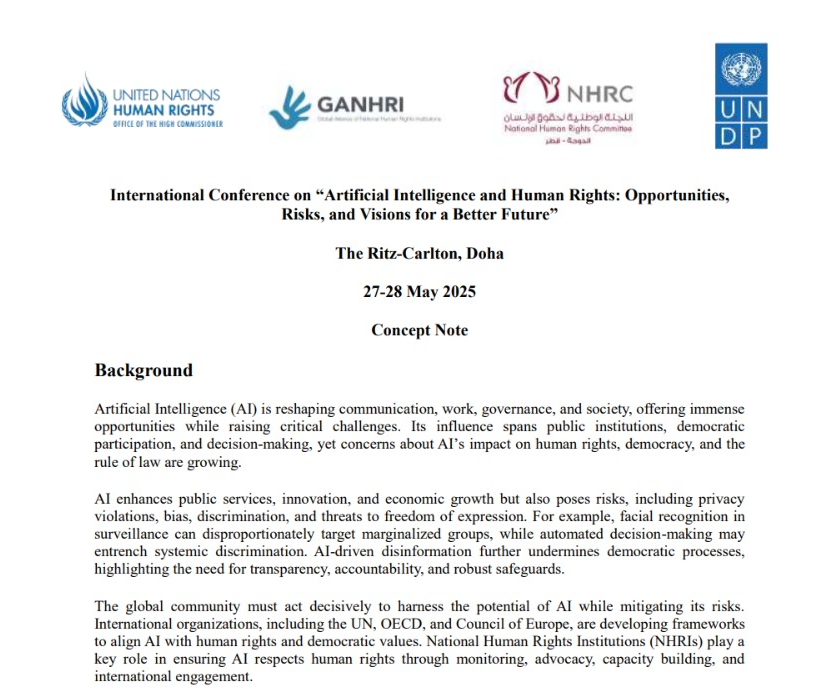

Doha, the capital of Qatar, is set to host an international conference titled “Artificial Intelligence and Human Rights: Opportunities, Risks, and Visions for a Better Future” on May 27–28, 2025.
The event is jointly organized by several key institutions, including the Social Research Center’s partner—the National Human Rights Committee of Qatar—as well as Qatar’s National Cyber Security Agency, the United Nations Development Programme, the Global Alliance of National Human Rights Institutions, and the Office of the United Nations High Commissioner for Human Rights. The conference is also supported by a range of international stakeholders active in the field of digital technologies. At the invitation of the leadership of Qatar’s National Human Rights Committee, Chairman of the Board of the Social Research Center, Zahid Oruj, will take part in the conference as one of the keynote speakers, leading a delegation from the Center.
Among the keynote speakers at the upcoming conference are several high-ranking officials and international leaders: Chairperson of Qatar’s National Human Rights Committee, Maryam bint Abdullah Al Attiyah; Qatar’s Minister of Communications and Information Technology, Mohammed bin Ali bin Mohammed Al Mannai; President of the National Cybersecurity Agency of Qatar, Abdulrahman Ali Muhammad Al Farahid Al Malki; United Nations High Commissioner for Human Rights, Volker Türk; Chairperson of the Global Alliance of National Human Rights Institutions, Amina Bouayach; President of the Arab Parliament, Mohammed Ahmed Al-Yamahi; and Director of the UNDP Regional Hub for Arab States, Mary Kawar.
The conference is expected to bring together over 500 participants from across the globe. Among them will be a diverse mix of government officials and policymakers, experts in artificial intelligence and digital society, human rights advocates, legal specialists, AI ethics experts, representatives of civil society organizations, academic researchers, international institutions, as well as members of the private sector and developers from leading tech companies. One of the event’s primary objectives is to adopt a final declaration outlining a roadmap and recommendations for embedding human rights principles into AI governance. This document will also highlight the participants’ collective commitment to advancing human rights in the digital age.
The conference will feature a series of panels focused on the following topics:
• Power of Artificial Intelligence and Human Rights: Exploring Risks and Opportunities;
• Need for Ethical Governance of Artificial Intelligence: Best Practices;
• Human Rights and Artificial Intelligence: Perspectives from National Human Rights Institutions;
• AI, Democracy, and Human Rights: Protecting Elections, Trust, and Governance;
• AI and National Security: Presentation and Discussion of Case Studies;
• AI in Military: Presentation and Debate on Exemplary Research Studies;
• Future of Media in Context of Artificial Intelligence and Human Rights: Risks and Innovations;
• Transformations Brought by AI to Employment and Workplaces: Challenges and Prospects;
• AI and Privacy: Threats to Personal Data, Surveillance, and Privacy Rights;
• Bias and Discrimination: Eliminating Algorithmic Bias and Ensuring Fairness;
• Freedom of Expression: Role of AI in Content Moderation, Censorship, and Protecting Free Speech;
• AI Governance and Accountability: Human Rights–based AI Policies, Transparency, and Redress Mechanisms;
• Digital Equality and Accessibility: Ensuring Fair Access to AI Resources and Bridging the Digital Divide;
• AI for Well-being: Positive Applications in Healthcare, Justice, Environment, and Education;
• Legal and Ethical Frameworks: Laws, Policies, and Ethical Standards for Responsible AI;
• AI and Future of Work: Impacts on Employment, Labor Rights, and Economic Inequality;
• AI and Security: Militarization, Armed Conflict, and Protection of Human Rights;
• AI and Democracy: Role of AI in Shaping Democratic Institutions and Promoting Inclusive Participation.
All presentations delivered at the conference will be compiled and published in a book. The event also includes several important meetings and the signing of a memorandum.